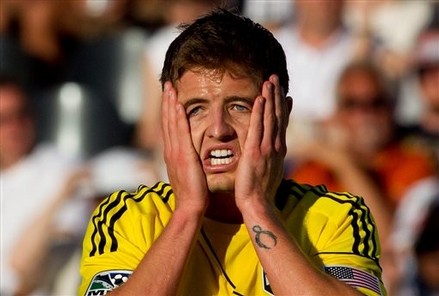
Earlier this year Robbie Rogers left Leeds United, retiring from professional soccer at only 25 years old and simultaneously coming out as gay. In his first interview since retiring, Rogers talks to The Guardian about why it was important for him to “find peace” away from the football field because he couldn’t face his teammates as a gay man.
On why he couldn’t come out and keep playing: In football it’s obviously impossible to come out – because no one has done it. No one. It’s crazy and sad. I thought: ‘Why don’t I step away and deal with this and my family and be happy?’ Imagine going to training every day and being in that spotlight? It’s been a bit of a circus anyway – but that would have been crazy. And you wouldn’t have much control because clubs are pushing you in different directions. I was just fearful. I was very fearful how my team-mates were going to react. Was it going to change them? Even though I’d still be the same person would it change the way they acted towards me – when we were in the dressing room or the bus?
On homophobia in the locker room: There were different emotions. Sometimes I would feel bad for them. Sometimes I would laugh because it was kinda funny. And, sometimes, it got malicious. That was when I would get this awful feeling in my stomach. I would turn my head and try to chat about other things. They often don’t mean what they say. It’s that pack mentality – they’re trying to get a laugh, they’re trying to be the top guy. But it’s brutal. It’s like high school again – on steroids.
On how an out player could change homophobia in football (and how that player isn’t him): I might be strong enough but I don’t know if that’s really what I want. I’d just want to be a footballer. I wouldn’t want to deal with the circus. Are people coming to see you because you’re gay? Would I want to do interviews every day, where people are asking: ‘So you’re taking showers with guys – how’s that?’If you’re playing well it will be reported as: ‘The gay footballer is playing well.’ And if you have a bad game it’ll be: ‘Aw, that gay dude . . . he’s struggling because he’s gay.’ Fuck it. I don’t want to mess with that.
 Why you can trust Xtra
Why you can trust Xtra


